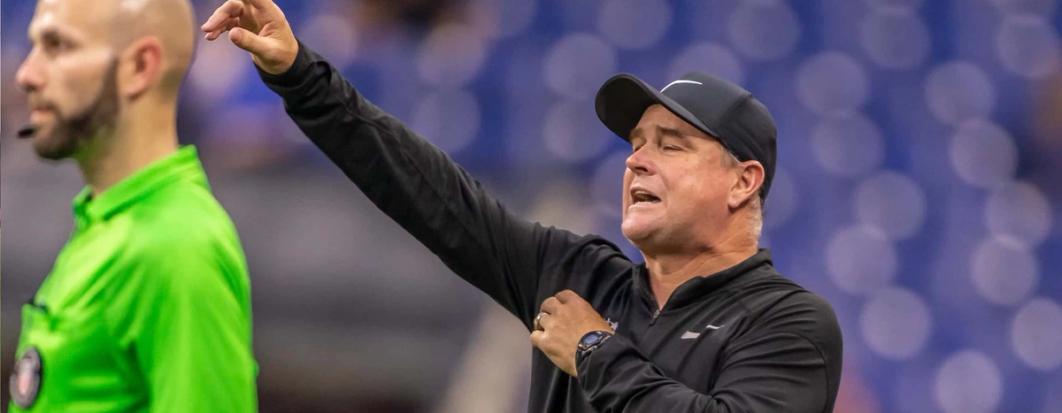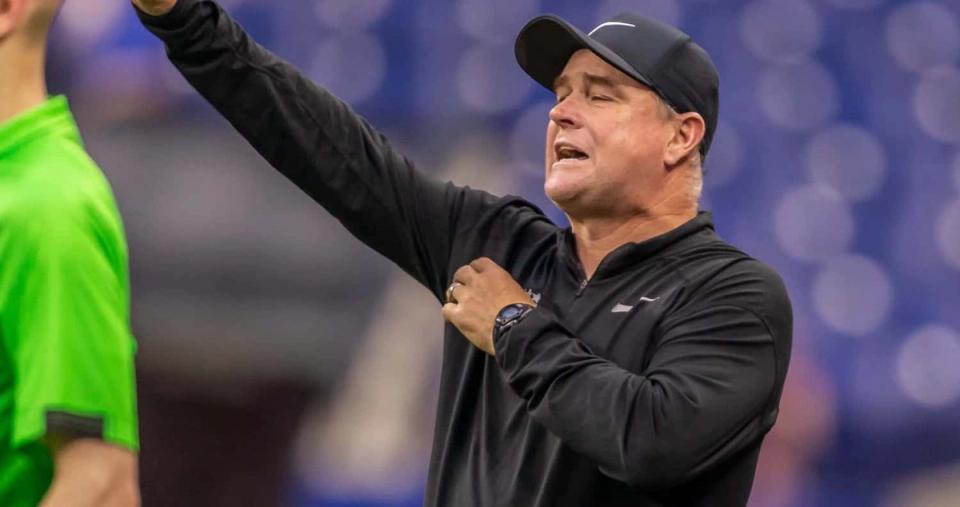Mike Anhaeuser’s been with the Charleston Battery for all 26 years of the club’s life – and he’s forgotten more about the Lamar Hunt U.S. Open Cup than most will ever know. ussoccer.com had the pleasure of sitting down for an animated, all-encompassing chat with the last coach to lead a non-Major League Soccer (MLS) team to the tournament Final. Among the topics open for discussion were that glorious run of 2008 and why it was “amazing and great and disappointing”, what the Open Cup means in Charleston, why hunger matters and why he thinks the time is right for a winner to come from below the top-tier for the first time in 20 years.
ussoccer.com: Reaching the Final once, the semis twice and the quarters three times, the Charleston Battery seem to have a special bond with the Open Cup.
Michael Anhaeuser: From back when I was playing [he was a midfielder with the club for three seasons before taking over as coach in 1999], from the beginning of the Charleston Battery 26 years ago in 1993, the Open Cup was something really high on the list. We wanted to compete for the title, not just make runs. It was our goal from the beginning to really go on and win it.
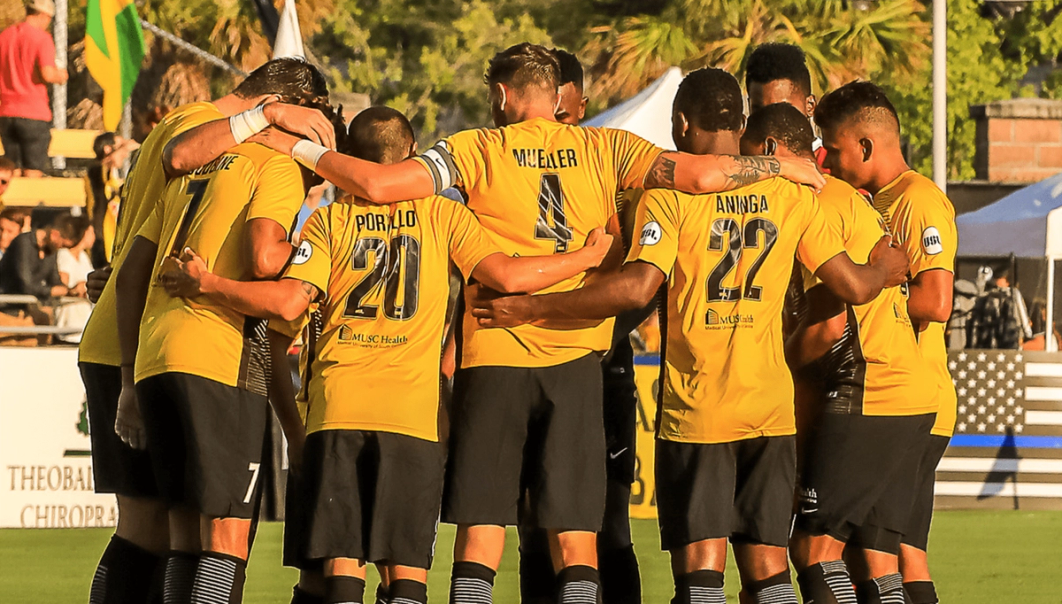
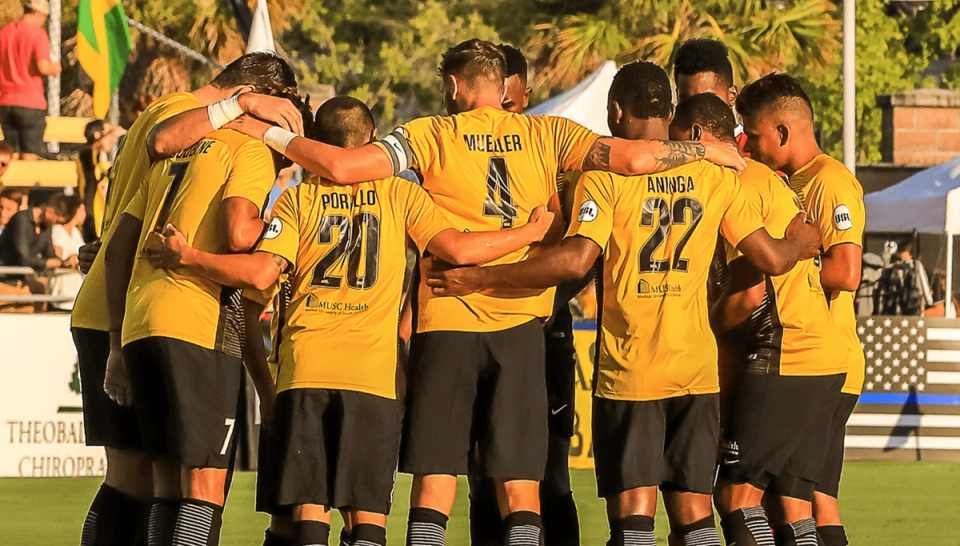
The Charleston Battery are aiming for another shock run in 2019
You can’t talk about the Battery and the Open Cup without talking about 2008, when you guys went all the way to the Final.
MA: That year showcased and enforced the Cup as something really important at the club. We put a lot of onus on winning it. We had Lazo Alavanja [a former collegiate star at Indiana University, like Anhaeuser], Osvaldo Alonso [who went on to become a 11-year MLS vet with Seattle Sounders], Ian Fuller [Minnesota United assistant coach], Marco Reda [Canada international] and Randy Patterson [of New York Red Bulls and Trinidad & Tobago]. We had experienced guys. We had about five or six guys in the team that just had that pure winning mentality. You can’t overestimate what that means. It didn’t matter who we played against, they had the quality to compete and to win on the day. But we had the quality back then too. Oh yes we did.
Is it harder these days for a non-MLS team to make a deep run in the Cup?
MA: It was easier back then because you were probably only going to have to get past two, or maybe three, MLS teams. But now it’s more like four or five. It keeps getting harder and harder. We try to keep it at the same level here at the Battery and strive for success. I play a lot of my starters in the early rounds; not everyone does that. In the old days, MLS teams didn’t want a home game, so we got to play a lot at home. But it’s not like that any more. It’s another edge lost; it makes it that much harder
Is it tough to find a balance between league play and Cup play with a USL team?
MA: Is it hard to find a balance? Yeah, definitely. When you have a smaller roster like we do it’s not ever easy to find the balance [laughs]. You’ve got games coming at you all the time. Saturday, Wednesday, Saturday, Wednesday. You’re burning all the time. It’s nice to get a break, but it doesn’t always come and you have to find the balance between using some young guys and really pushing, really leaning, on your experienced players. If you pick up an injury – which happens when you’re playing a lot of games – then you’re scrambling. Then you have to shuffle your pack and improvise.
Was there much scrambling and shuffling in 2008?
MA: I was playing starters in the Cup from the beginning, putting a focus on it. I’d bring in new guys for the league games sometimes, rookies and guys without too much experience. You needed them, and you might lose some of those league games, but you have to prioritize in years like that. Those are special times and you have to recognize it. We had a lot of home games in 2008 [Just two of their six games were on the road that year]. That helps.
.@Chas_Battery - 2008 runners-up - are Open Cup royalty & they're into the Fourth Round after a hard-fought 1-1 draw (AET) and a PK shootout against @NashvilleSC. Now they get a shot at team from @MLS. 👏
— U.S. Open Cup (@opencup) May 30, 2019
📺 Highlights | #USOC2019 pic.twitter.com/Zscvpfm0s3
Does succeeding in the Open Cup require a special intensity?
MA: I compare it to the NCAA [basketball] tournament. I think it’s like that in a lot of ways. It has the same feeling and the same intensity. It’s one-and-done. I’m a big fan of this. That format brings out something special. You need luck, sure, and a bit of quality on the day. We won many games on penalties in 2008. We beat Seattle in a shootout. You need all those things to fall into place, but it’s no different than Loyola-Chicago in the NCAA tournament last year. You have those guys people don’t know about and that’s important – you need those hungry guys trying to go higher.
Do your players today understand the meaning of those successes 11 years ago?
MA: It’s helped us here that we’ve had success in the Cup. It gets in their belly. I can show them what it’s like and that it can be done. They know it when they’re here. But all of that just helps a little – what’s really important is that we beat Atlanta United [Their Fourth Round Open Cup opponent for the third straight year]. That’s what really matters. The past and the tradition, that just helps us a little before the opening whistle.
It’s obvious that the Open Cup has special meaning for you.
MA: It’s not just me. For our club, the Open Cup is huge. I say that before the first game to my guys, “If you win this, you’re playing an MLS team.” It’s the first statement I make and I make sure my players know what I’m saying. I believed it as a player and I believe it as a coach: all players want to play the best. That’s a given. And MLS aren’t just throwing out reserve teams in the Cup. It’s changing and evolving. The Open Cup has taken two steps forward. The prize money is up – it’s 300,000 now to the winner and that’s a bump. One more sponsor here or there and it could be huge in American sports.
You mentioned being hungry. How important is that in the Cup, as a team and as individuals?
MA: Well, we won’t get anything out of Atlanta United unless we’re hungry. Having guys who are hungry to show what they can do and to take the next step is huge. You’re putting yourself in the shop window in a big way as a player. It makes a big difference if a coach sees you first-hand instead of on tape – a massive difference.
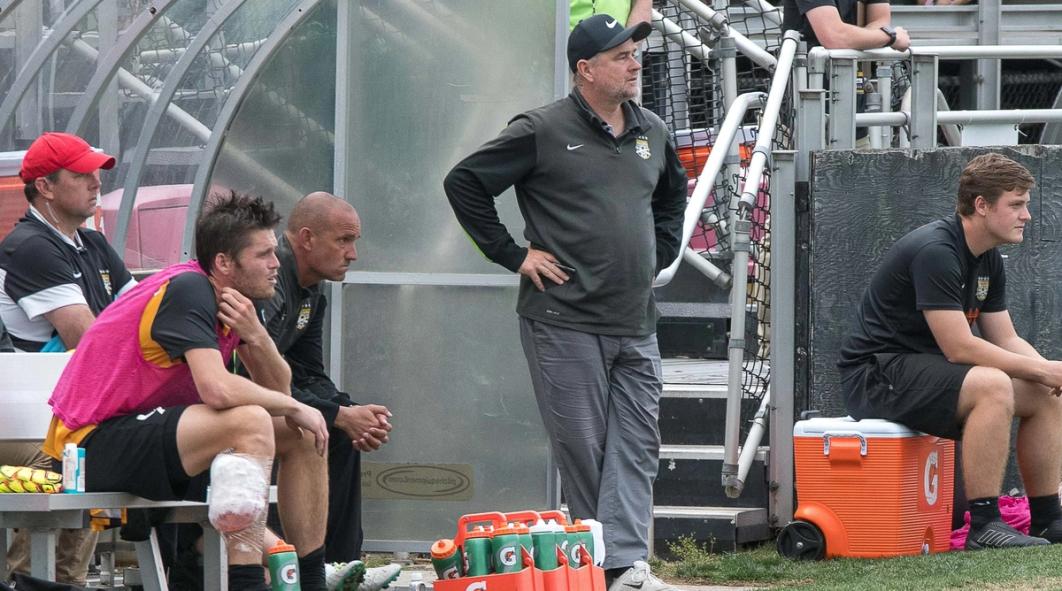
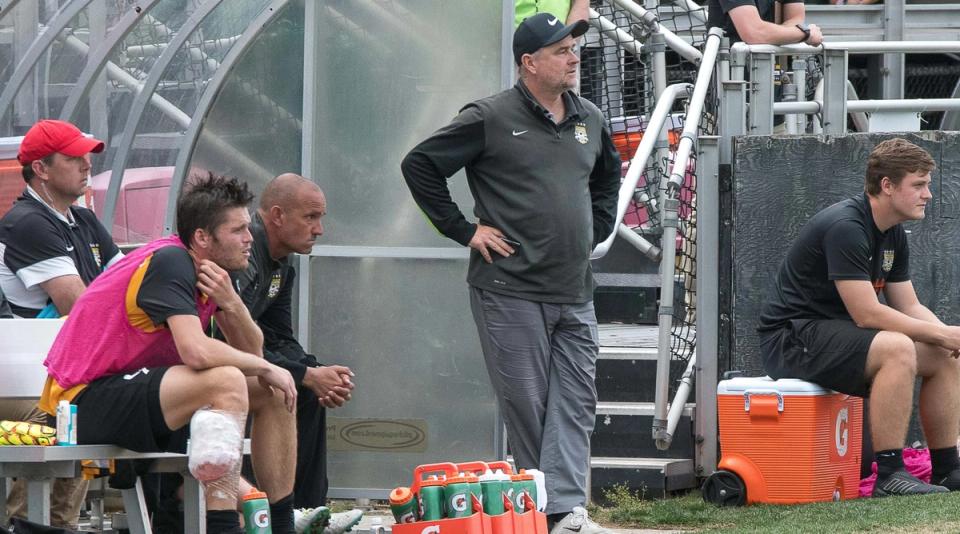
Mike Anhaeuser has been involved with the Battery for the club’s entire history
That’s what happened with Osvaldo Sanchez, who was so impressive with Charleston and ended up signing with Seattle after you beat them in 2008.
MA: Yeah, exactly. Our 2008 run was just the start for him and look what he’s gone on to achieve. We played in Seattle and we pushed them and beat them, and they signed him up just like that. You get seen in the Open Cup. It gives those guys a chance, so you have to be hungry because you don’t want to miss a chance.
The Battery has been around for 26 years – first in the USISL, then the USISL Pro League and now in the USL Championship. How has the club changed in those years?
MA: I treat the club the same way I did in my first year here. We were the Battery then and we’re the Battery now. We’re the same as we ever were as far as I’m concerned. We have the club and the history and things are expected of us here. People didn’t know us back then and then we had a little success and people wondered if we could carry it on. But now we have a lot of years behind us and we have a tradition.
How much of that tradition is connected to the Open Cup?
MA: A lot of it is connected to the Open Cup. It’s something special for us and for our players. Whether they’re rookies, or guys on loan from MLS, or our veterans. We’ve been there as a club. We have a chance to win it. I truly believe this and I try to pass it on every year. You have to believe it. You win and you move on. We have that always on our minds. Five games or something like that and you’re in the Final. Not in front of 4,000 people like it was in the past, but now you’re in front of 40,000 people maybe. That’s a big difference. We’re carrying on a tradition here and we don’t want to lose sight of that. We’re here and we’ve been here. But look what the Cup did for a club like FC Cincinnati two years ago [the Ohio side went to the Semifinal and were this week named Major League Soccer’s newest franchise]. The same thing could happen for us. We want to be the best we can be as a club – and the Open Cup is an opportunity, every year, to win something.
In the Open Cup, you go from being favorites to underdogs in weeks. Do you have to prepare differently for Atlanta United than you would for Nashville SC?
MA: You try not to prepare the team differently no matter who you play. That’s what you try, anyway. But it’s difficult not to be aware of it when you’re playing an MLS team – when you’re up against an Atlanta United you know it. You might play in the first games against amateur teams and a few guys are getting their first starts. I’m nervous in those games when I put a new guy out there – because you’re expected to win. You lose, and it’s not a good feeling. It’s happened to us and, trust me, you don’t want it. It’s going to happen – it’s just the nature of the beast, but you want to do all you can to avoid it happening to you.
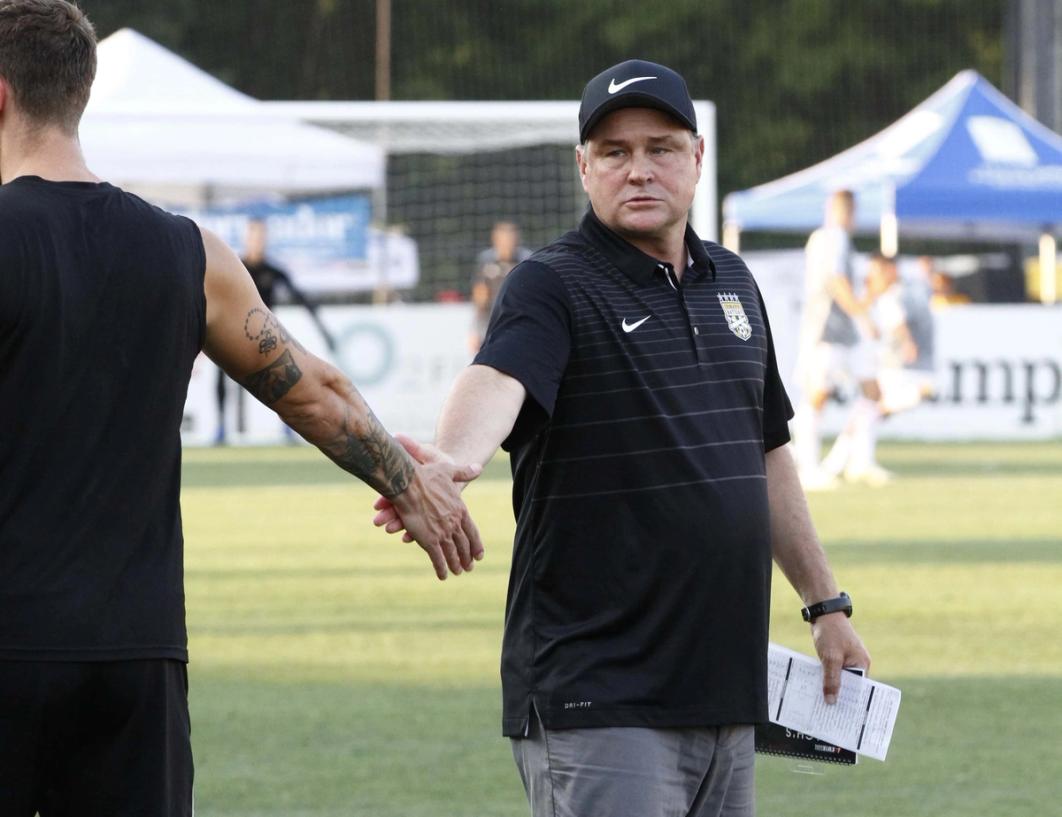
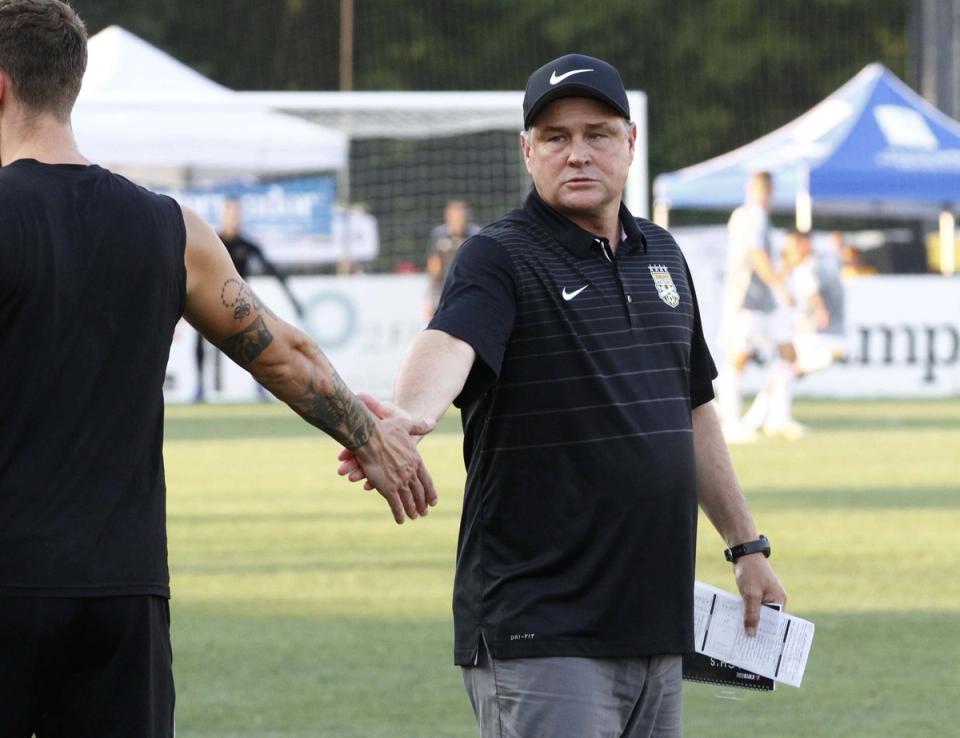
The coach thinks it’s still possible for a non-MLS team to reach the Final
No matter what it looks like, getting the preparations right seems key.
MA: You really just have to make sure you get that right. We have to prepare for Atlanta United as a style – we know their style pretty well. You prepare for a team like you do any game and you make sure your own team is prepared. But, believe me, it’s easy to prepare my team for an MLS opponent. They’re motivated. If they’re not, they’re in the wrong business.
With the tradition, the preparation and the hunger right, do you think something like what happened in 2008 could happen again?
MA: Well, we’re only in the Fourth Round now so we can’t get too far ahead of ourselves, but I do use that 2008 Final run as a motivation. We were a few bounces away from winning the Open Cup. We were in the Final at RFK against D.C. United – with all their tradition and talent – but we tied them up at 1-1. Then we went ahead, but the goal was called back for offside. It was only my third year as a head coach. It was a huge thing. We were right there.
Is it the kind of thing you look back at with disappointment or pride – or both?
MA: It was very disappointing to lose, because you build up an expectation when you make it that far. When you compete so well and go so far, you‘re not happy just to make it there – we were unhappy that we lost. But we were there for a reason. It was amazing and great and disappointing. It’s easy for me to pass this feeling on to the players now because I still have that feeling in my belly. I’d love to get Charleston back there for the players of today. They’d never forget it. People out there might forget that we made it to the Final – but we won’t forget. Not here at the Battery. What we did was what is amazing about the Cup – we were a lower division team and we had a chance to win it. This is a for-real opportunity. It just takes one or two upsets here or there and you’re a champion.
